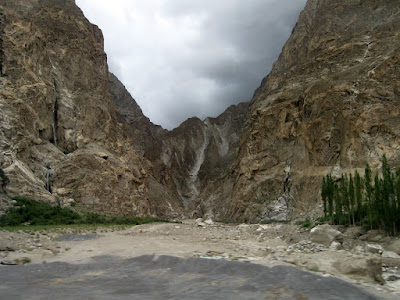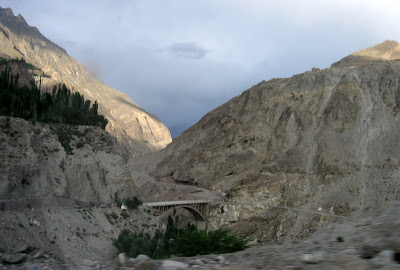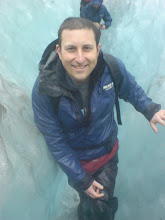After a quick breakfast of fried eggs, chapati, and tea - Denis, Hugo and myself squeezed ourselves into a small minibus along with twenty one other people to make the one hour journey to Passu. Needless to say – the scenery was incredible.



There was no one at the Passu Inn when we arrived so we sat in the garden and had cold drinks while we waited for the owner to arrive. After arranging our rooms, we headed out to find lunch, and then made our way along a trail to find the Passu glacier.
The main road at Passu:

The green fields of the village, kept fertile by the glacial waters:


There's a map just behind where I'm sitting now that shows all of the glaciers in the area, and it's amazing how many and how easy to access they all are.
Scenery on the way to the glacier:



After about an hour we came to the glacier, and made our way up the Moraine until we were standing right on the top, just around from the terminal face. As the rocks were so unstable – with huge boulders threatening to crash down on us – we made our way back down and along the lake shore, and after some scrambling came to within 20 meters of the terminal face.
The terminal face of the Passu Glacier:


Denis and Hugo scrambling over the giant boulders towards the Glacier face:

And looking away from the Glacier:

Cold air rushed down the huge glacier that stretches far up the mountain side, while water rushed from the cave like opening.
And then we walked back through the moraine with the smell of sage strong in the summer sunshine, the amazing ridge of mountains on all sides. I can't think of a single place I've been in the world where the mountains rise so sharply and to such a great height.
The view towards Passu - the almost unreal quality of the view adds to the atmosphere:

At the bridge across the river we met Alex, from France, whose riding a BMW GS from Paris to Kathmandu, and he decided to stay at the Passu Inn. We arrived back to find that Alison had made it to Passu on her second day, and so we all had dinner together before calling it a night.
----------
I've not been feeling one hundred percent for the last few days, and was having some mild asthma symptoms. But there was a trek in the Planet that we all wanted to do, and with a light drizzle and the mountains covered in cloud we set off.
The Passu Glacier covered by mist:

Having walked for a while I started to struggle as we hit a steep up hill section, and concious that I was holding everyone else back, reluctantly decided to return to the village.

It felt like the waste of a good day, and I was feeling really deflated and frustrated as I trudged slowly back to Passu. Except the day was going to take an unexpected turn, and provide me with one of the most memorable experiences of my trip.

Not wanting to be cooped up, I set off to meander slowly through the village, and on my way a man told me that there would be some music festivities and that I should come back in twenty minutes. So I dropped my things at the Inn, and wandered back towards the school.
On my way, I met Rasool, who invited me to join the festivities that were just about to start.
Yesterday was the day that Aga Khan, the spiritual leader of the Ismaili Muslims became the Imam, and they hold several days of activities, and today – the village was gathering to dance.
Originally planning only to watch from the back and then leave without being noticed, I was soon ushered up onto a covered area in the school yard, and told to sit on one of the few padded seats as the music started. I quickly worked out that the seats were reserved for the elders of the village, and ended up sitting with Rasool on one side, and the village Imam on the other.
Three musicians provided lively music, while the men danced. After an hour, the school yard was packed, the women on one side – all dressed in beautiful and brightly coloured saris, with the men sitting on the other side.
As the festivities went on, Rasool provided a running commentary on what was happening, who was who, and the history of the village and school.
The people in Pasu are Tajik descendants who many years ago came from what is now Tajikistan, via Afghanistan, and into Northern Pakistan. The village believes that education is key – and educate both girls and boys in mixed classes. In fact, the village of Pasu now has two schools to cater for all the children.
Many of the former children are highly educated, and as they danced, Rasool would tell me where each of the young men lived, and what his profession was. There were doctors, engineers, several high ranking army officers – all living in Islamabad, Karachi, or Lahore. All had returned for the festival.
Rasool also explained to me that there were people from Passu working all over the world – and named half a dozen countries and the various professions - all the former students were highly qualified and in respected professions.
The dancing would follow a set format. One of the men – clearly the organiser – would get some of the men up too dance – they would always say no, no, but would soon be dancing.
One would lead, the others would follow, and then the lead would change, until three or four people had led around the school yard, and then the original leader would lead for a while and the dance would end.
Everyone danced – young and old. Even the young men from the big cities, who were dressed in modern western clothes and would not have looked out of place in Manchester. Everyone was encouraged, and the atmosphere was supportive as people clapped and cheered. When the woman all laughed at one of the boys who made a wrong turn leading his group the men shouted encouragmenet, and everyone cheered him on.
And then – disaster. The band stopped. The organiser announced something.
And then he pointed at me. A special dance for our honoured guest - Rasool translated and smiled.
And then they were calling me to join in the dance. Five young men got up and one led off the dancing, and I tried my best to follow as the six or seven hundred people cheered on. And then – to make it worse – the man who had been leading stepped back – and told me it was my turn to lead.
I felt nothing but encouragement as I stumbled my way around the school yard, arms in the air, spinning around while the other men followed and everyone cheered. As I passed the organiser he was shouting encouragement at me in Urdu with a huge smile. I didn't need any translation.
And then one of the other men took over, and I stumbled along trying to match his moves. Needles to say – my dancing was the worst of the day – by a long way. Some of the men – particularly the young guys seemed so connected in to the complicated rhythms, and some of the moves would have been at home even in the most complex of Bollywood routines.
And then – thankfully – it was over, and I returned to my seat.
I spent an incredible afternoon with the people of the village - it was my honour and privileged to be invited to join them. My thanks to the people of Passu for making it a day that I'll never forget.


































































